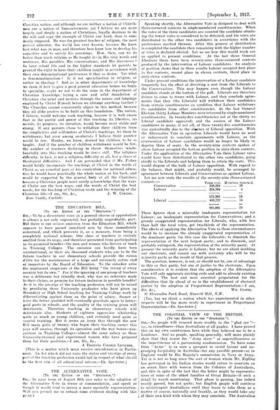MR. FISHER'S BILL AND RELIGIOUS EDUCATION. [To THE EDITOR or
TEE "SPECTATOR."' • Sue—Mr. Fisher is being greatly blamed for the omission from his Bill of better provision for religious instruction in the nation'. schools. But who is primarily to blame for this omission ? As his speeches and public interest in education abundantly testify, it is not Mr. Fisher himself who ought chiefly to be blamed. Ha knows quite well that without a sound religions foundation it is, as a rule, impossible to build up a good and beautiful fabric of either national or individual telemeter. But 'he remembers the fate of former Education Ministers and Education Bills in their dealings with this sacred matter, and probably thinks that his Bill might be wrecked if he launched it on these da nger°. shoal., and tumultuous seas. He shrewdly judges that half a loaf is better than no bread, and that if he cannot get all the good Mims. he would wish into his Bill lie will accept those he is able Is get and leave the rest to be obtained at some future and more auspicious time.
Bet the nation cannot afford to postpone ibis quest:on indefi- nitely. For without religion children can never grow to the full stature of their manhood or womanhood: no secure sanction can be established for morals, no stability imparted to domestic or social life; nor ran the nation attain the realization of its noblest ideals. Somehow or other, therefore, we most incorporate religion as an integral part of our national education. It is a factor which cannot be eliminated without rendering many of the most urgent problems of our national life insoluble. To whom, then, is this grand enterprise to be entrusted ? We cannot relegate it to the Churches, because, estimated by attendance at public worship, all the Churches combined together constitute only a fraction. and that not a large one, of the entire people. We cannot leave it to Sunday-schools, because, among other ;newtons. the -number of their scholars is steadily diminishing. We profess to be
Christian nation, and although we are neither a nation of Church- men nor a nation of Nonconformists, yet I believe we are more largely and deeply a nation of Christians, loyally desirous to do the will and copy the example of Christ our Lord, than is com- monly supposed. He was the greatest teacher of religion, the most perfect educator, the world has ever known, because He knew best what was in men, and therefore best knew how to develop his capacities and to satisfy his yearnings. How, then, can we do better than teach religion as He taught it—in His very words and sentences, His jmrables, His conversations, and His discourses ? In later school life and in the higher standards let parents be granted the right to have their children taught in accordance with their own denominational preferences if they so desire. Yet what is denominationalism ? Is it not specialization in religion, or rather in theology ? And as in other departments of knowledge we deem it beet to give a geed general education before we begin to specialiae, ought we not to do the same in the department of Christian knowledge, laying a sure and solid foundation of tffiristien character and motives through the means and language employed by Christ Himself before we attempt anything further ? The Churches cannot consistently object to this method, because they all alike profess to be built on this foundation. The nation, I believe, would welcome such teaching, because it is well aware that in the purity and power of this teaching its liberties, its morals, its progress, its elevation, would become most stable and strong. If any parents chose to withdraw their children from the simplicities and sublimities of Christ's teachings, let them he withdrawn; but even among secularists I believe their nominee would be few. Huxley, we know, desired his children to be so taught. And if the number of children withdrawn would be few, the number of teachers declining to throw themselves whole- heartedly into this teaching would be fewer still. The religious difficulty, in fact, is not a religious difficulty at all, but a chaos of theological difficulties. And I am persuaded that if Mr. Fisher would boldly incorporate the teachings of Christ in the words of Christ as an essential part of his curriculum for national educa- tion he would have practically the whole nation at his bock, and would be supported by tine general body of all the Churches; because a Christian people must surely acknowledge that the ways of Christ are the best ways, and the words of Christ the hest words, for the teaching of Christian truth and the winning of the



































 Previous page
Previous page